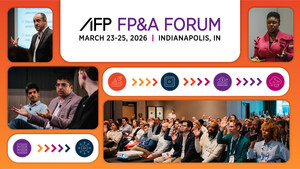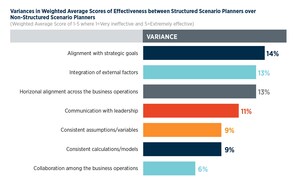
Technology, Trade Drive B2B E-Payments in US, AFP Survey Finds
International business transactions accelerate adoption of electronic payments methods
WASHINGTON, Nov. 8, 2010 /PRNewswire-USNewswire/ -- Advances in technology, increased focus on business improvement, and the need to make cross-border payments have driven large U.S. corporations to adopt more electronic payments for B2B transactions, according to the Association for Financial Professionals (AFP). The 2010 AFP Electronic Payments Survey (www.afponline.org/payments) showed that the typical organization makes only 57% of its B2B payments by paper check.
Underwritten by J.P. Morgan Treasury Services, the report follows earlier AFP surveys that found 74 percent of organizations made B2B payments by check in 2007, down from 81 percent in 2004.
Where prior surveys showed a clear intention by U.S. corporations to shift volume to electronic payments, results this year show they are succeeding, particularly with their major trading partners. Nearly half of the survey respondents expect their organizations to convert B2B payments to major suppliers from checks to electronic payments in the next three years.
And whereas check float and system integration difficulties for electronic payments used to keep many companies tied to check payments in the past, over the last six years, those barriers have begun to give way. In addition, more than six out of seven financial professionals believe that there are no significant regulatory barriers keeping their organizations from increasing their usage of electronic payment methods.
Financial professionals say the benefit of moving to e-payments includes cost savings (52 percent), improved cash forecasting (40 percent), and fraud control (37 percent).
GLOBAL TRANSACTIONS
This gradual migration to electronic payments brings the U.S. more in line with Europe and Asia where electronic payments are the norm for business transactions and where they are the only form of business payment in countries like Finland, Germany, the Netherlands and Poland.
"We think electronic payments have been a key enabler for the growth in global trade and cross-border payments," said David Bellinger, AFP's director of payments, who also sees further decline ahead for check payments in the U.S. "Most cross-border payments are done by wire already, mainly because companies still need the certainty around finality of funds and timing of receipt. Those needs won't change, but over time alternatives to wires will likely take over some volume and eliminate most of the remaining cross-border check payments."
According to the survey, a full 69 percent of cross-border payments transmit through wire transfers, 14 percent using checks and 12 percent from payments sent via treasury operations that the organization has in local countries. Contractual requirements, transaction size, cost and currency risk influence the choice of payment method.
In terms of transaction volume, 78 percent of participating organizations send at least some of their payments cross-border.
"The confluence of declining check volume, marketplace forces, technology developments and globalization we are witnessing today is unprecedented," said Diane Quinn, managing director and large corporate segment executive, J.P. Morgan Treasury Services. "Even given the pressing economic environment, businesses are investing in treasury technologies necessary to streamline workflow processes, reduce costs and gain faster, more accurate visibility into their cash positions."
FUTURE PAYMENTS
Looking ahead, U.S. companies are interested in leveraging e-payment technology for other uses. Of those surveyed, 58 percent indicated that their organizations are likely to use the same-day settlement of ACH services to make tax payments when made available. Corporations also cite an interest in using electronic payments for cash concentration and other corporate account transfers (43 percent), payroll (41 percent), and consumer/e-check services (39 percent).
Despite the acceleration of mobile payments at the consumer level, few organizations currently use mobile payments for business transactions, though this is clearly a trend to watch: A quarter of organizations are evaluating increasing their use of mobile tools for payments within the next three years.
About AFP®
The Association for Financial Professionals (AFP), headquartered outside Washington, D.C., serves a network of more than 16,000 members with news, economic research and data, treasury certification programs, networking events, financial analytical tools, training, and public policy representation to legislators and regulators. AFP is the daily resource for the finance profession.
AFP's global reach extends to over 150,000 treasury and financial professionals worldwide, including AFP of Canada; London-based gtnews, an on-line resource for the treasury and finance community; and bobsguide, a financial IT solutions network. See www.afponline.org.
About J.P. Morgan Treasury Services
J.P. Morgan's Treasury Services business is a full-service provider of innovative cash management, trade, liquidity, commercial card and escrow services -- specifically developed to meet the challenges treasury professionals face today. More than 135,000 corporations, financial institutions, governments and municipalities in over 180 countries and territories entrust their business to J.P. Morgan. J.P. Morgan Treasury Services is one of the world's largest providers of treasury management services and a division of JPMorgan Chase Bank, N.A., member FDIC. More information can be found at www.jpmorgan.com/ts.
Available Topic Expert: For information on the listed expert, click appropriate link.
David Bellinger
http://www.profnetconnect.com/David_Bellinger
SOURCE Association for Financial Professionals







Share this article